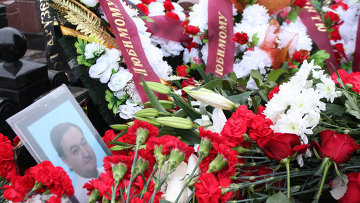MOSCOW, March 19 - RAPSI. Family members of deceased whistleblower Sergei Magnitsky, rejected the claims of Russian investigators that no evidence of criminal activity was found in connection with Magnitsky’s 2009 death in a pre-trial detention center, according to a statement released by the family on the heels of the investigators’ announcement Tuesday.
On November 24, 2008, Magnitsky, an auditor of Hermitage Capital, was arrested on suspicion of masterminding large-scale corporate tax evasion. He died in Butyrka pretrial detention center on November 16, 2009 after spending a year behind bars. According to the Prosecutor General's Office, his death was caused by cardiovascular insufficiency.
On Tuesday, Russian investigators announced their decision to drop the investigation of his death based on a lack of evidence of foul play.
Magnitsky’s mother expressed cynicism with regard to the Russian justice system, stating: “[The decision by Russian authorities to close the case into the death of Sergei Magnitsky] was expected. I don’t believe that it is possible to obtain justice in Russia today because there are people in power interested in concealing it and someone is directing this process.”
His widow remarked that the case was obviously tinged by wrongdoing, pleading: “They have concealed from us the details of the death of my husband. However, even what is already known shows that his death was no accident.”
Hermitage Capital wrote the investigators’ findings off as a cover-up.
Formerly, Dmitry Kratov, former deputy chief of the Butyrka pretrial detention center, and the ward's doctor, Larisa Litvinova, were defendants in the case of Magnitsky's death. In December 2012, the court acquitted Kratov of negligence which resulted in Magnitsky's death. The case against Litvinova was closed in spring 2012 following amendments to the Criminal Code affecting the statute of limitations.
While no one will be held to account for the whistleblower’s early demise, the coast is not yet clear, for Magnitsky himself. Under Russian law, it is possible to prosecute a dead defendant. Magnitsky is the first such individual to be prosecuted in accordance with the law.
The prosecutorial right to investigate a case against a deceased person, and a court’s right to consider such a case, was established in the Russian judicial system on July 14, 2011. That was the day when the Constitutional Court of the Russian Federation declared unconstitutional a number of provisions of the Criminal Procedure Code which allowed a case to be dropped on the grounds that the suspect had died, regardless of the relatives’ insistence that he be rehabilitated.
Prior to his death, Magnitsky was arrested and accused alongside Hermitage CEO William Browder of large-scale tax evasion. Denying these claims, Hermitage maintained that they had paid their taxes, but that certain officials had embezzled 5.4 billion ($174 mln) rubles from the federal budget, a claim later refuted by Russia’s Interior Ministry.
The proceedings presently on-going against Magnitsky and Browder stem from this disputed sum.



